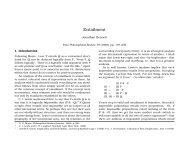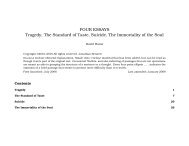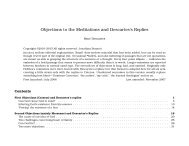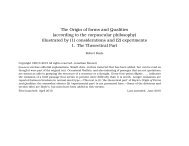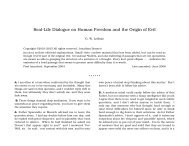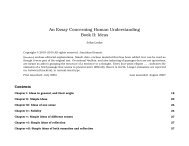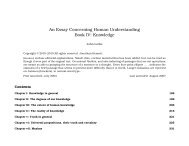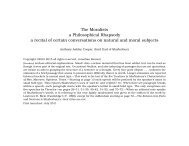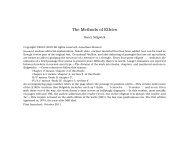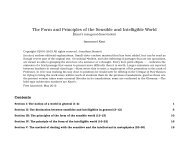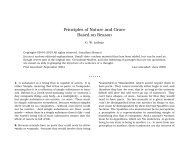A Vindication of the Rights of Woman with - Early Modern Texts
A Vindication of the Rights of Woman with - Early Modern Texts
A Vindication of the Rights of Woman with - Early Modern Texts
Create successful ePaper yourself
Turn your PDF publications into a flip-book with our unique Google optimized e-Paper software.
The <strong>Rights</strong> <strong>of</strong> <strong>Woman</strong> Mary Wollstonecraft 3: The same subject continued<br />
which might again have been inspired and returned. . . . Her<br />
children have her love, and her brightest hopes are beyond<br />
<strong>the</strong> grave, where her imagination <strong>of</strong>ten strays.<br />
I think I see her surrounded by her children, reaping <strong>the</strong><br />
reward <strong>of</strong> her care. . . . Health and innocence smile on <strong>the</strong>ir<br />
chubby cheeks; and as <strong>the</strong>y grow up, <strong>the</strong> cares <strong>of</strong> ·her· life<br />
are lessened by <strong>the</strong>ir grateful attention. She lives to see <strong>the</strong><br />
virtues that she tried to tried implant in her children through<br />
•principles become fixed in <strong>the</strong>m as •habits, and to see her<br />
children achieve enough strength <strong>of</strong> character to be able to<br />
endure adversity <strong>with</strong>out forgetting <strong>the</strong>ir mo<strong>the</strong>r’s example.<br />
The task <strong>of</strong> life thus fulfilled, she calmly waits for <strong>the</strong><br />
sleep <strong>of</strong> death. When she rises from <strong>the</strong> grave she can say ·to<br />
God· ‘Behold, you gave me a talent, and here are five talents’.<br />
[This is a variant on a story in Mat<strong>the</strong>w 25; a talent was a coin.]<br />
* * * * *<br />
I want to sum up what I have said in a few words: I here<br />
throw down my gauntlet [= ‘pose a challenge to anyone who wants to<br />
oppose me’] and deny that <strong>the</strong>re is any way for a woman to be<br />
virtuous that isn’t also a way for a man to be virtuous—and<br />
modesty is not an exception to that. If I understand <strong>the</strong><br />
meaning <strong>of</strong> <strong>the</strong> word, truth must be <strong>the</strong> same for man and<br />
for woman; yet <strong>the</strong> fanciful female character that poets and<br />
novelists draw so prettily demands <strong>the</strong> sacrifice <strong>of</strong> truth and<br />
sincerity; and so virtue becomes a relative idea, based on<br />
nothing but utility, and men set <strong>the</strong>mselves up as judges <strong>of</strong><br />
utility, shaping it to <strong>the</strong>ir own convenience.<br />
Women may have different duties to fulfill, but <strong>the</strong>y are<br />
human duties, and I firmly maintain that <strong>the</strong> principles that<br />
should regulate <strong>the</strong> performance <strong>of</strong> <strong>the</strong>m must be <strong>the</strong> ones<br />
that hold for all human beings.<br />
35<br />
To become worthy <strong>of</strong> respect, women must use <strong>the</strong>ir<br />
understandings; <strong>the</strong>re is no o<strong>the</strong>r basis for independence<br />
<strong>of</strong> character. I mean explicitly to say that <strong>the</strong>y must only<br />
bow to <strong>the</strong> authority <strong>of</strong> reason, instead <strong>of</strong> being <strong>the</strong> modest<br />
slaves <strong>of</strong> opinion.<br />
In <strong>the</strong> upper ranks <strong>of</strong> life we seldom we meet <strong>with</strong> a man<br />
<strong>of</strong> superior abilities, or even one whose abilities are about<br />
average! The reason seems to me clear: <strong>the</strong> state <strong>the</strong>y are<br />
born in was an unnatural one. The human character has<br />
always been formed by <strong>the</strong> employments <strong>the</strong> individual or<br />
class pursues; and if <strong>the</strong> faculties are not sharpened by<br />
necessity, <strong>the</strong>y must remain obtuse [= ‘blunt’]. The same line<br />
<strong>of</strong> thought can fairly be extended to women. [MW is saying that<br />
women in general tend to be dim in <strong>the</strong> way that men who have titles or<br />
high rank or great wealth tend to be dim.] That is because most <strong>of</strong><br />
<strong>the</strong>m have no serious occupations; <strong>the</strong>y are left to <strong>the</strong> pursuit<br />
<strong>of</strong> pleasure, which gives to <strong>the</strong>ir character <strong>the</strong> triviality that<br />
makes <strong>the</strong> society <strong>of</strong> <strong>the</strong> great so insipid. The lack <strong>of</strong> firmness,<br />
produced by a similar cause, forces <strong>the</strong>m both—·‘great’<br />
men and all women·—to fly from <strong>the</strong>mselves [MW’s phrase] to<br />
noisy pleasures and artificial passions, until vanity takes<br />
place <strong>of</strong> every social affection, and <strong>the</strong> characteristics <strong>of</strong><br />
humanity almost disappear from sight. The blessings <strong>of</strong> civil<br />
governments as <strong>the</strong>y are at present organized operate in<br />
such a way that wealth and female s<strong>of</strong>tness equally tend<br />
to debase mankind, and are produced by <strong>the</strong> same cause.<br />
If women are rational creatures <strong>the</strong>y should be urged to<br />
acquire virtues that <strong>the</strong>y can call <strong>the</strong>ir own, for how can a<br />
rational being be ennobled by anything that is not obtained<br />
by his or her own efforts?



